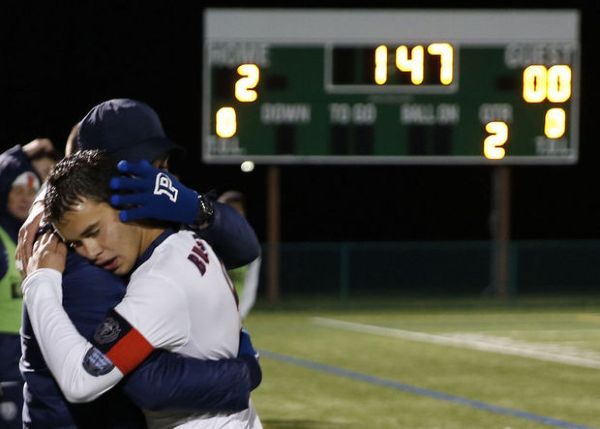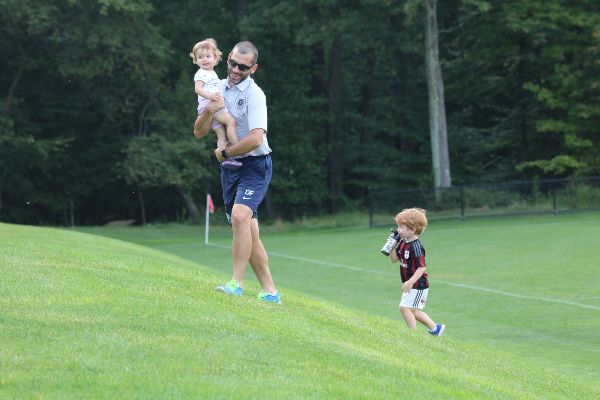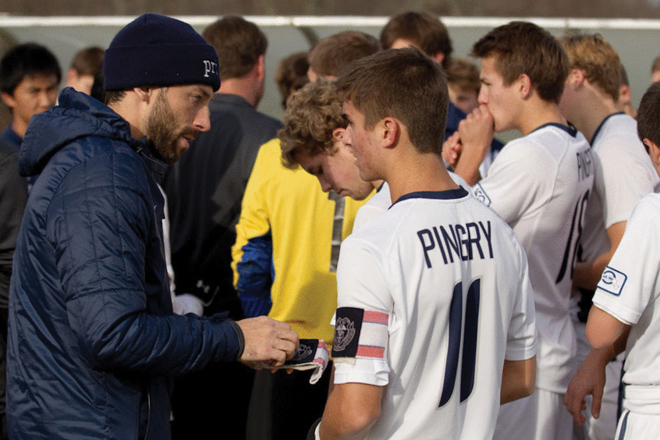Article by David Fahey, The Pingry School
above: Fahey with the Pingry soccer team
The youngest of six children, I had an opportunity that none of my siblings had: attending an independent school. Now, as a staff member and coach at my high school alma mater, it is no exaggeration to say that my early experience at Pingry shaped my life tremendously.
During my four years at the school, I was passionate about soccer. I played under Coach Miller A. Bugliari, the nation’s winningest high school soccer coach. Coach Bugliari graduated from Pingry in 1952, became coach in 1960 and has held the position ever since. His accolades include a recent induction into the National High School Hall of Fame. Far more significant to me, however, is that he and his assistant coach at the time, Adam Rohdie (who was Pingry’s assistant headmaster and is now headmaster at The Greenwich Country Day School), have been and continue to be invaluable mentors.
I like to say I was a “modest scholar” while at Pingry. My real passion was on the field, but both Coach Bugliari and Coach Rohdie helped me hone far more than my soccer skills. They encouraged me to think about academics, character and what I wanted to do with my life.

I went on to play soccer at Boston and planned to work at Pingry after for a year or two before attending law school. For two years, I worked in Pingry’s development office and coached boys’ soccer and lacrosse. Coaching was incredibly fulfilling for me, but I was eager to follow my intended path into law. So I studied at Rutgers Law part-time at night, worked as a paralegal during the day and made time to continue coaching in the afternoons. Those few hours on the field each day kept me motivated through law school.
When I graduated with my JD, I thought I would put coaching behind me. I practiced law full time, but I still followed Pingry’s soccer team. And every day at 3 p.m., I felt like I was missing out on something important. After two years as a divorce lawyer, I wanted to try something else professionally. A conversation with Coach Bugliari convinced me to return to Pingry while I figured out my next steps.
In a highly competitive school, where failure often doesn’t feel like an option, extracurricular activities are an important outlet. On the field, develop grit through failure. Playing on a team also provides a different teaching model, one in which teammates assume leadership roles and help one another grow.
As it happened, Pingry was embarking on a $65 million capital campaign, in part to create an athletic center named in honor of my longtime mentor. I returned to work in the development office. It felt heaven-sent: I could continue to honor Coach Bugliari’s legacy by while taking some time to consider how I would transition back into a different specialty within the practice of law. But the longer I worked at Pingry, the more I fell back in love with the community. After five years and the conclusion of the capital campaign, I decided not to return to but to take a new position in the business office, reporting to the CFO and director of operations, Olaf Weckesser. The role was a great fit, as it combined many of my skill sets and allowed me to continue coaching.
I truly believe in the country day school model, which seeks to nurture and develop not only young minds but the body, too. In a highly competitive school, where failure often doesn’t feel like an option, extracurricular activities are an important outlet. On the field, develop grit through failure. Playing on a team also provides a different teaching model, one in which teammates assume leadership roles and help one another grow. Each fall, one of the first things I say to my players is that practicing technical and tactical soccer drills also prepares you for life off the soccer field.

The amount of time away from home, away from my wife and two children, is certainly a challenge of coaching. I scout opponents, study film, take calls from alumni at any hour and visit college players at their games. I want to make as profound an impact on my players as my coaches made on me — I still call Adam Rohdie every few months for guidance.
I feel very fortunate that Pingry embraces the faculty/staff-as-coaches model. If I need to leave my desk at 2 p.m., Pingry trusts that I will finish my work when I return. To be sure, coaching is also a benefit to my work in the business office, making me recognizable in the school community as a steward of the institution who cares deeply about students’ success.




